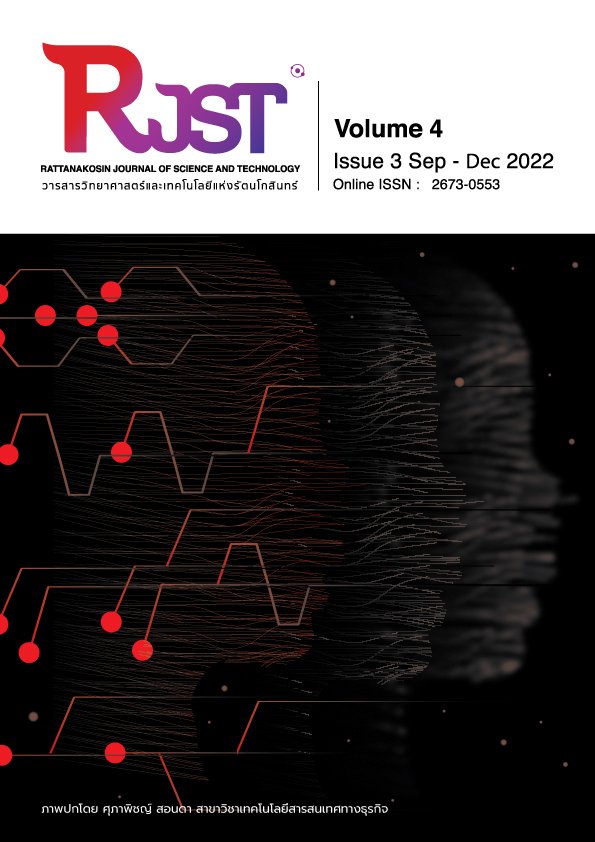The Efficacy of Coenzyme Q10 for Improving Vigilance
Main Article Content
Abstract
Dementia is a major problem that occurs in an increasing number of populations with a faster aging process. The first symptom that causes it is a loss of awareness and vigilance, which leads to cognitive decline, leading to dementia. The objective of this study was to study the efficacy of Coenzyme Q10 by taking a supplement containing 200 mg of Coenzyme Q10 daily for 8 weeks to improve awareness and vigilance. This study was an experimental study in 31 female subjects, aged 40 to 60 years without mild cognitive impairment (MCI), divided in 2 groups. Experimental group contained 15 subjects taking Coenzyme Q10 extract and controlled group contained 16 subjects taking placebo. This study used the Trail Making Test A and the Modified Mackworth Clock Test to measure reaction time and accuracy rate at the beginning of the study and at 4 and 8 weeks. In this study, the 8-week improvement in measurement accuracy was improved in both groups from the learning curve, but there was no significant difference between the two groups (p>0.05) at each time interval. For the measure of response time, there was no significant reduction (p>0.05) in either group, and no significant difference between the two groups (p>0.05) at each time point. Therefore, it was concluded that coenzyme Q10 intake in females aged 40-60 years without dementia did not improve awareness and vigilance.
Article Details

This work is licensed under a Creative Commons Attribution-NonCommercial-NoDerivatives 4.0 International License.
The content within the published articles, including images and tables, is copyrighted by Rajamangala University of Technology Rattanakosin. Any use of the article's content, text, ideas, images, or tables for commercial purposes in various formats requires permission from the journal's editorial board.
Rajamangala University of Technology Rattanakosin permits the use and dissemination of article files under the condition that proper attribution to the journal is provided and the content is not used for commercial purposes.
The opinions and views expressed in the articles are solely those of the respective authors and are not associated with Rajamangala University of Technology Rattanakosin or other faculty members in the university. The authors bear full responsibility for the content of their articles, including any errors, and are responsible for the content and editorial review. The editorial board is not responsible for the content or views expressed in the articles.
References
Zholdassova, M. K., Matthews, G., Kustubayeva, A. M., & Jakupov, S. M. (2012). The cognitive neuroscience of vigilance – A test of temporal decrement in the Attention Networks Test (ANT). International Journal of Psychological and Behavioral Sciences, 65, 791-796.
Martel, A., Dahne, S., & Blankertz, B. (2014). EEG predictors of covert vigilant attention. Journal of Neural Engineering, 11.
Spindler, M., Beal, M. F., & Henchcliffe, C. (2009). Coenzyme Q10 effects in neurodegenerative disease. Neuropsychiatric disease and treatment, 5, 597-610.
Nattagh-Eshtivani, E. (2018). The effect of Coenzyme Q10 supplementation on serum levels of lactate, pyruvate, matrix metalloproteinase 9 and nitric oxide in women with migraine. A double blind, placebo, controlled randomized clinical trial. European Journal of Integrative Medicine, 21, 70 - 76. https://doi.org/10.1016/j.eujim.2018.06.009
Cornelius, N. (2017). Evidence of oxidative stress and mitochondrial dysfunction in spinocerebellar ataxia type 2 (SCA2) patient fibroblasts: Effect of coenzyme Q10 supplementation on these parameters. Mitochondrion, 34, 103-114.
https://doi.org/10.1016/j.mito.2017.03.001
Schulz, J. B., & Beal, M. F. (1995). Neuroprotective effects of free radical scavengers and energy repletion in animal models of neurodegenerative disease. Ann N Y Acad Sci, 765, 100-118. https://doi.org/10.1111/j.1749-6632.1995.tb16565.x
Yoritaka, A. (2015). Randomized, double-blind, placebo-controlled pilot trial of reduced coenzyme Q10 for Parkinson's disease. Parkinsonism & Related Disorders, 21(8), 911-916. https://doi.org/10.1016/j.parkreldis.2015.05.022
Ostrowski, R. P. (2000). Effect of coenzyme Q10 on biochemical and morphological changes in experimental ischemia in the rat brain. Brain Res Bull, 53(4), 399-407. https://doi.org/10.1016/s0361-9230(00)00406-8
Crane, F. L., Löw, H., Sun, I., Navas, P., & Gvozdjáková, A. (2014). Plasma membrane coenzyme Q: Evidence for a role in autism. Biologics, 8, 199-205. https://doi.org/10.2147/btt.s53375
Cucinotta, F., Ricciardello, A., Turriziani, L., Mancini, A., Keller, R., Sacco, R., . . . Persico, A. M. (2022). Efficacy and Safety of Q10 Ubiquinol With Vitamins B and E in Neurodevelopmental Disorders: A Retrospective Chart Review. Front Psychiatry, 13, 829516. https://doi.org/10.3389/fpsyt.2022.829516.
Tiano, L., Carnevali, P., Padella, L., Santoro, L., Principi, F., BrugË, F., . . . Littarru, G. P. (2011). Effect of Coenzyme Q10 in mitigating oxidative DNA damage in Down syndrome patients, a double blind randomized controlled trial. Neurobiology of Aging, 32(11), 2103-2105. https://doi.org/10.1016/j.neurobiolaging.2009.11.016
Choudhary, D., Bhattacharyya, S., & Bose, S. (2017). Efficacy and Safety of Ashwagandha (Withania somnifera (L.) Dunal) Root Extract in Improving Memory and Cognitive Functions. Journal of Dietary Supplements, 14(6), 599-612. https://doi.org/10.1080/19390211.2017.1284970
Par, R. Y. X., Teo, C. W. L., Tan, J. J. K., Ung, Y. W., Heng, K. S., Hang, L. T., . . . Yap, W. N. (2022). An open-label, single-arm pilot study of tocotrienols supplementation on improving memory and attention in healthy young adults. Journal of functional foods, 92, 1050-1055.


